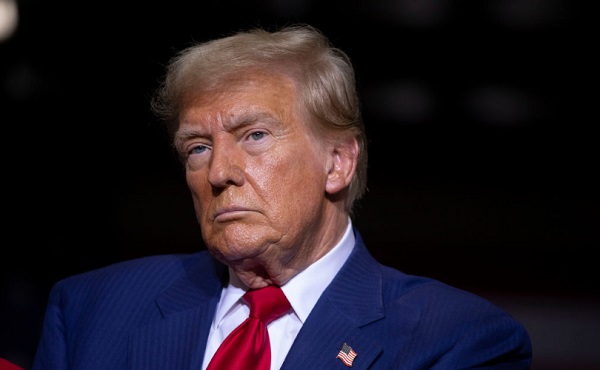International
Trump sues New York Times for $10 billion over ‘false and defamatory statements’

From LifeSiteNews
A letter from President-elect Donald Trump’s attorney accuses the New York Times of being ‘a full-throated mouthpiece of the Democratic Party’ that uses ‘industrial-scale libel against political opponents.’
President-elect Donald Trump’s attorney has sent a letter to the New York Times (NYT) and book publisher Penguin Random House (PRH) demanding $10 billion in damages over “false and defamatory statements.”
The letter reportedly arrived a few days before the presidential election but has just recently come to light.
“There was a time, long ago, when the New York Times was considered the ‘newspaper of record,” wrote Trump’s attorney, Edward Andrew Paltzik, according to the Columbia Journalism Review (CJR), which reviewed the 10-page letter. “Those halcyon days have passed.”
The letter accuses the NYT of being “a full-throated mouthpiece of the Democratic Party” that uses “industrial-scale libel against political opponents.”
According to CJR, the letter singles out two stories co-authored by Susanne Craig and Russ Buettner “that related to their book on Trump and his financial dealings, Lucky Loser: How Donald Trump Squandered His Father’s Fortune and Created the Illusion of Success, released on September 17.”
The letter also called attention to an October story headlined “For Trump, a Lifetime of Scandals Heads Toward a Moment of Judgment” by Peter Baker and an October 22 article by Michael S. Schmidt titled “As Election Nears, Kelly Warns Trump Would Rule Like a Dictator.”
Trump’s attorney alleges in his letter that the NYT had “every intention of defaming and disparaging the world-renowned Trump brand that consumers have long associated with excellence, luxury, and success in entertainment, hospitality, and real estate, among many other industries, as well as falsely and maliciously defaming and disparaging him as a candidate for the highest office in the United States.”
“Given the long list of well-known and historic business achievements by President Trump and his family, President Trump’s remarkable business, literary, media, and real estate achievements, and the fact that President Trump – and his life story – are the epitome of the American Dream and what it means to be an American patriot, as well as his lifelong support for America’s men and women in uniform, these defamatory statements are all the more despicable in their falsity,” states the letter to the NYT.
The NYT has reportedly referred Paltzik to PRH concerning the accusations stemming from Buettner and Craig’s book and that the newspaper stands by their reporting.
The NYT is not the only left-leaning media outlet being targeted by the president-elect’s attorneys.
The Trump campaign has also sued CBS for $10 billion over the network’s 60 Minutes October interview with Democrat presidential candidate Kamala Harris, alleging that the edited video report that was broadcast misled the public and unfairly disadvantaged the Republican candidate, amounting to election interference.
“To paper over Kamala’s ‘word salad’ weakness, CBS used its national platform on 60 Minutes to cross the line from the exercise of judgment in reporting to deceitful, deceptive manipulation of news,” the lawsuit alleges.
Trump’s attorney accused CBS of shifting “into overdrive to get Kamala elected,” and accused the network of “partisan and unlawful acts of voter interference through malicious, deceptive and substantial news distortion.”
The former and future president has had a long-standing feud with media outlets that have overwhelmingly published negative stories about him and his administration.
Shortly after his inauguration in 2017, President Trump declared that the press is “the enemy of the American people.”
Two years later, Trump reiterated that sentiment and said, “The press is doing everything within their power to fight the magnificence of the phrase, MAKE AMERICA GREAT AGAIN!”
Business
‘Great Reset’ champion Klaus Schwab resigns from WEF

From LifeSiteNews
Schwab’s World Economic Forum became a globalist hub for population control, radical climate agenda, and transhuman ideology under his decades-long leadership.
Klaus Schwab, founder of the World Economic Forum and the face of the NGO’s elitist annual get-together in Davos, Switzerland, has resigned as chair of WEF.
Over the decades, but especially over the past several years, the WEF’s Davos annual symposium has become a lightning rod for conservative criticism due to the agendas being pushed there by the elites. As the Associated Press noted:
Widely regarded as a cheerleader for globalization, the WEF’s Davos gathering has in recent years drawn criticism from opponents on both left and right as an elitist talking shop detached from lives of ordinary people.
While WEF itself had no formal power, the annual Davos meeting brought together many of the world’s wealthiest and most influential figures, contributing to Schwab’s personal worth and influence.
Schwab’s resignation on April 20 was announced by the Geneva-based WEF on April 21, but did not indicate why the 88-year-old was resigning. “Following my recent announcement, and as I enter my 88th year, I have decided to step down from the position of Chair and as a member of the Board of Trustees, with immediate effect,” Schwab said in a brief statement. He gave no indication of what he plans to do next.
Schwab founded the World Economic Forum – originally the European Management Forum – in 1971, and its initial mission was to assist European business leaders in competing with American business and to learn from U.S. models and innovation. However, the mission soon expanded to the development of a global economic agenda.
Schwab detailed his own agenda in several books, including The Fourth Industrial Revolution (2016), in which he described the rise of a new industrial era in which technologies such artificial intelligence, gene editing, and advanced robotics would blur the lines between the digital, physical, and biological worlds. Schwab wrote:
We stand on the brink of a technological revolution that will fundamentally alter the way we live, work, and relate to one another. In its scale, scope, and complexity, the transformation will be unlike anything humankind has experienced before. We do not yet know just how it will unfold, but one thing is clear: the response to it must be integrated and comprehensive, involving all stakeholders of the global polity, from the public and private sectors to academia and civil society …
The Fourth Industrial Revolution, finally, will change not only what we do but also who we are. It will affect our identity and all the issues associated with it: our sense of privacy, our notions of ownership, our consumption patterns, the time we devote to work and leisure, and how we develop our careers, cultivate our skills, meet people, and nurture relationships. It is already changing our health and leading to a “quantified” self, and sooner than we think it may lead to human augmentation.
How? Microchips implanted into humans, for one. Schwab was a tech optimist who appeared to heartily welcome transhumanism; in a 2016 interview with France 24 discussing his book, he stated:
And then you have the microchip, which will be implanted, probably within the next ten years, first to open your car, your home, or to do your passport, your payments, and then it will be in your body to monitor your health.
In 2020, mere months into the pandemic, Schwab published COVID-19: The Great Reset, in which he detailed his view of the opportunity presented by the growing global crisis. According to Schwab, the crisis was an opportunity for a global reset that included “stakeholder capitalism,” in which corporations could integrate social and environmental goals into their operations, especially working toward “net-zero emissions” and a massive transition to green energy, and “harnessing” the Fourth Industrial Revolution, including artificial intelligence and automation.
Much of Schwab’s personal wealth came from running the World Economic Forum; as chairman, he earned an annual salary of 1 million Swiss francs (approximately $1 million USD), and the WEF was supported financially through membership fees from over 1,000 companies worldwide as well as significant contributions from organizations such as the Bill & Melinda Gates Foundation. Vice Chairman Peter Brabeck-Letmathe is now serving as interim chairman until his replacement has been selected.
International
Pope Francis’ funeral to take place Saturday

From LifeSiteNews
By Michael Haynes, Snr. Vatican Correspondent
The rounds of voting to elect a new pope, the Church’s law stipulates that this must begin between 15 and 20 days after the pope dies.
Pope Francis’ funeral will take place on Saturday, April 26, the Vatican has announced, following the public veneration of his body in the days prior.
In an announcement issued Tuesday morning, the office of papal liturgical ceremonies gave details about Pope Francis’ funeral and the public paying respect to his remains.
On Saturday morning at 10 a.m. Rome time, the funeral for the deceased pontiff will take place in St. Peter’s Square. It will be presided over by Cardinal Giovanni Battista Re who is Dean of the College of Cardinals. Following this, the pope’s remains will be transferred inside the basilica, and from there will be taken to the Basilica of St Mary Major’s, where he is to be buried in accord with his wishes.
Prior to that, the pope’s remains will be on public display in St. Peter’s Basilica, for members of the faithful to pay their respects. He will be taken from the Casa Santa Martha guesthouse to the Vatican Basilica on Wednesday morning, and there displayed in front of the high altar for all to see.
Many thousands of pilgrims were due to be in Rome this weekend for the canonization of Blessed Carlo Acutis. However, following the pope’s death on Monday morning, the ceremony has been postponed, with no replacement date yet being given. For many, though, their journey to Rome will still take place but with the sombre rites of a simplified papal funeral instead of the joyous ceremony of a canonization.
The announcement of the pope’s funeral arrangements came during the course of the first of the General Congregations for the College of Cardinals, which began at 9 a.m. on Tuesday morning. [To read LifeSiteNews’ full explainer on the process following a pope’s death, see here]
Cardinals not already in Rome will have to hastily travel to the city, in order to take part in the congregations as well as the funeral.
The second of the General Congregations will take place tomorrow afternoon, after the cardinals join in the solemn rite of translation of the pope’s body into the Vatican. As part of the Holy See’s formal mourning period of nine days, the Novendiali, a Mass will be offered every afternoon at 5 p.m. The first day of the Novendiali is April 26, the date given for Francis’ funeral.
As for the start of the conclave itself and the rounds of voting to elect a new pope, the Church’s law stipulates that this must begin between 15 and 20 days after the pope dies. In this case, that would mean starting around May 6 at the earliest, and May 11 at the latest.
-

 International1 day ago
International1 day agoPope Francis has died aged 88
-

 International1 day ago
International1 day agoPope Francis Dies on Day after Easter
-

 International1 day ago
International1 day agoJD Vance was one of the last people to meet Pope Francis
-

 2025 Federal Election14 hours ago
2025 Federal Election14 hours agoOttawa Confirms China interfering with 2025 federal election: Beijing Seeks to Block Joe Tay’s Election
-

 2025 Federal Election14 hours ago
2025 Federal Election14 hours agoReal Homes vs. Modular Shoeboxes: The Housing Battle Between Poilievre and Carney
-

 COVID-1914 hours ago
COVID-1914 hours agoNearly Half of “COVID-19 Deaths” Were Not Due to COVID-19 – Scientific Reports Journal
-

 2025 Federal Election13 hours ago
2025 Federal Election13 hours agoHow Canada’s Mainstream Media Lost the Public Trust
-

 2025 Federal Election13 hours ago
2025 Federal Election13 hours agoPOLL: Canadians want spending cuts







